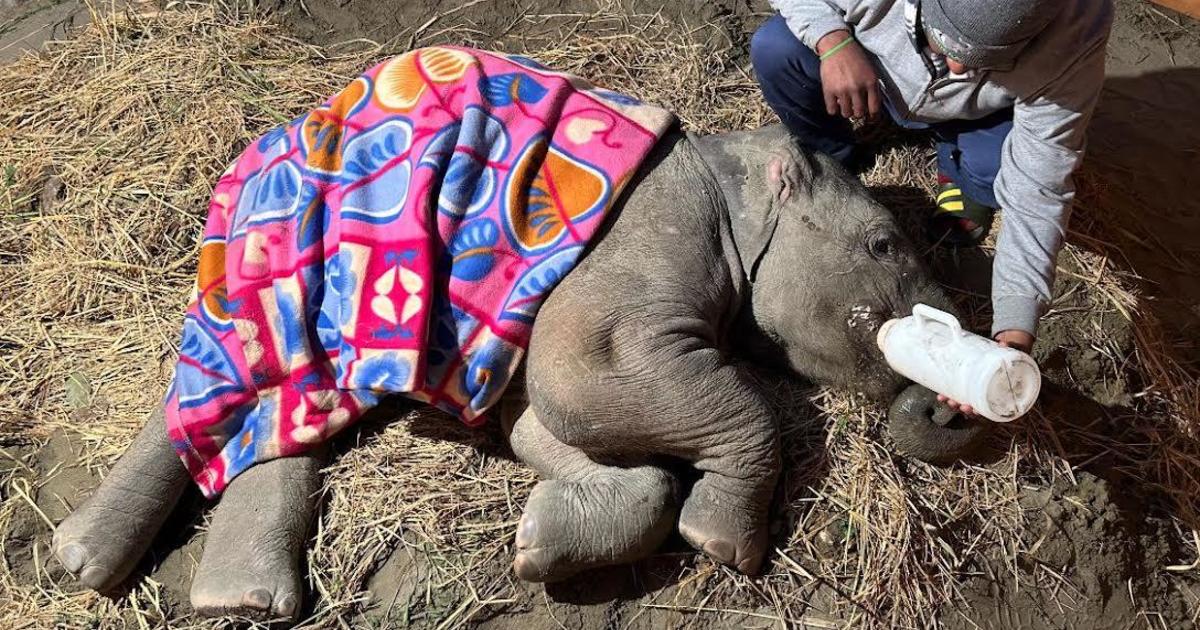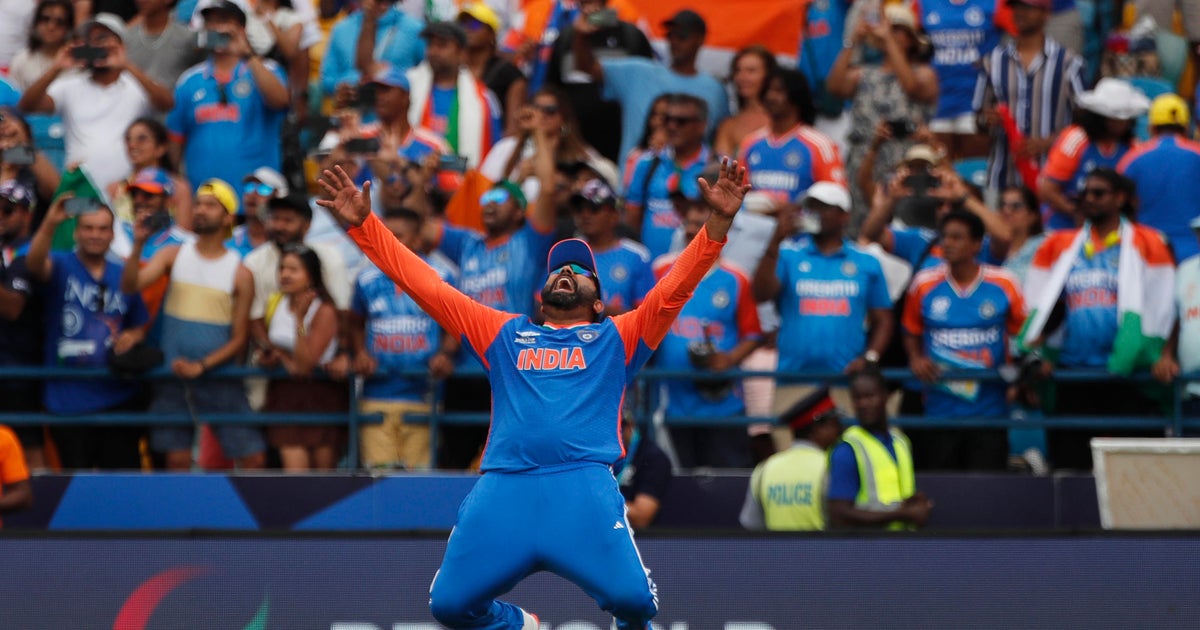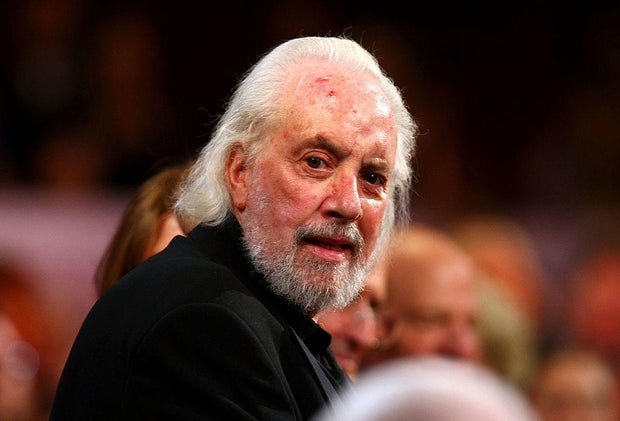CBS News
Rescuers work to get a baby elephant back on her feet after a train collision that killed her mother

New Delhi — Doctors at India’s first-ever elephant hospital are using every method at their disposal, from laser stimulation to ayurvedic massage and physiotherapy, to try to get a baby elephant back on her feet after she was struck by a train. It has been an uphill battle so far, and far from being a rare tragedy, the little elephant’s story is all too common in India.
NOTE: This article includes images of dead and injured animals that some readers may find disturbing.
The 9-month-old elephant, which rescuers have named Bani (Mother Earth), was hit by a speeding train near Corbett National Park in northern India in mid-December, leaving her seriously injured and paralyzed. Bani’s mother, who was pregnant at the time, died in the same accident.
Courtesy of Wildlife SOS
Wildlife authorities treated Bani for hip and spine injuries at a local facility for more than a month, but she showed no improvement. In early February, she was moved to the city of Mathura for treatment at India’s first veterinary hospital exclusively for elephants, run by the conservation organization Wildlife SOS.
Veterinarians at the hospital told CBS News there’s been some improvement in her condition, but they’re finding it challenging to pinpoint all of Bani’s fractures.
“We have taken multiple x-rays… but we could not see where exactly the bone breakages are,” Dr. A. Sha Arun, a senior veterinarian at the Wildlife SOS center told CBS News. “It’s a little challenging, because hip regions are bulky and not easy to penetrate with normal x-rays.”
Courtesy of Wildlife SOS
Vets told CBS News that Bani had multiple wounds to her back and groin, which have continued healing slowly.
“Initially we suspected a spinal injury, but the movement in her tail, normal digestion and body functions indicate that her body is responding to treatment,” said Dr. Ilayaraja S.
With the advanced treatment and multiple therapies the hospital has been able to provide, Bani has regained the use of her front legs. But her hind legs remain a cause for concern. Arun said it could take Bani up to three months to get back on her feet, and that’s assuming the treatment keeps going well.
Courtesy of Wildlife SOS
Scientists consider elephants one of the most emotionally advanced species, and the vets believe the violent death of Bani’s mother in the train crash is likely having some psychological impact, and possible slowing her physical recovery. But they have been encouraged as she’s started becoming more playful with her caregivers, holding their hands with her trunk, eating well and responding to treatment.
India’s elephant vs. train problem
The story of Bani and her mother is not a rare one in India, which is home to more than 20,000 wild elephants, or about 60% of the overall wild Asian elephant population.
In November 2023, three elephants were killed by a train in eastern India’s West Bengal state. In August, a pregnant elephant and two others were killed by another train in the same region.
On an average, 20 elephants are killed in train accidents every year, according to Indian government data. The deaths usually happen when elephants cross railway lines that run through their habitats.
AFP via Getty
Conservationists argue train tracks shouldn’t even exist in wildlife corridors, and they say India’s ever-expanding railway network overlooks the price wildlife is paying for transport connectivity in the world’s most populous nation.
“It’s a line of bloodshed,” conservationist Kartick Satyanarayan, co-founder and CEO of Wildlife SOS, told CBS News, referring to the tracks that run through India’s 150 elephant corridors.
The government has ordered trains passing through wildlife corridors to reduce their speed to prevent collisions with elephants, but Satyanarayan said train operators often ignore the order.
CBS News sought comment for this story from national operator Indian Railways, but received no response by the time of publication.
“The government should build elevated tracks for trains passing through wildlife corridors and make use of technologies like AI-powered alert systems to prevent such accidents,” Satyanarayan told CBS News.
STR/AFP/Getty
Last week, the southern Indian state of Tamil Nadu became the first to launch an artificial intelligence and machine learning-enabled surveillance system to help prevent elephant deaths on railway tracks.
India has lost about 200 elephants over the last decade to train accidents alone, and that’s in addition to high number of deaths from poaching and accidental electrocutions.
The domestic population of elephants, which are India’s national heritage animal, has dropped dramatically over the last century from 1 million to the current 20,000. That’s ringing alarm bells over the wider biodiversity of India’s forests, as elephants play a crucial role in ecosystems and food chains.
“They are called the farmers of the forest,” said Satyaranayan. “Loss of elephants will eventually affect everything, from agriculture to livelihoods.”
CBS News
7/2: CBS Evening News – CBS News

Watch CBS News
Be the first to know
Get browser notifications for breaking news, live events, and exclusive reporting.
CBS News
Robert Towne, legendary Hollywood screenwriter of “Chinatown,” dies at 89

Robert Towne, the Oscar-winning screenplay writer of “Shampoo,” “The Last Detail” and other acclaimed films whose work on “Chinatown” became a model of the art form and helped define the jaded allure of his native Los Angeles, has died. He was 89.
Towne “passed away peacefully surrounded by his loving family” Monday at his home in Los Angeles, his publicist Carri McClure, told CBS News in a statement. She did not provide a cause of death.
In an industry which gave birth to rueful jokes about the writer’s status, Towne for a time held prestige comparable to the actors and directors he worked with. Through his friendships with two of the biggest stars of the 1960s and ’70s, Warren Beatty and Jack Nicholson, he wrote or co-wrote some of the signature films of an era when artists held an unusual level of creative control. The rare “auteur” among screen writers, Towne managed to bring a highly personal and influential vision of Los Angeles onto the screen.
Alberto E. Rodriguez/Getty Images for AFI
“It’s a city that’s so illusory,” Towne told The Associated Press in a 2006 interview. “It’s the westernmost west of America. It’s a sort of place of last resort. It’s a place where, in a word, people go to make their dreams come true. And they’re forever disappointed.”
Recognizable around Hollywood for his high forehead and full beard, Towne won an Academy Award for “Chinatown” and was nominated three other times, for “The Last Detail,” “Shampoo” and “Greystoke.” In 1997, he received a lifetime achievement award from the Writers Guild of America.
“His life, like the characters he created, was incisive, iconoclastic and entirely (original),” said “Shampoo” actor Lee Grant on X.
Towne was born Robert Bertram Schwartz in Los Angeles and moved to San Pedro after his father’s business, a dress shop, closed down because of the Great Depression. His father changed the family name to Towne.
Towne’s success came after a long stretch of working in television, including “The Man from U.N.C.L.E” and “The Lloyd Bridges Show,” and on low-budget movies for “B” producer Roger Corman. In a classic show business story, he owed his breakthrough in part to his psychiatrist, through whom he met Beatty, a fellow patient. As Beatty worked on “Bonnie and Clyde,” he brought in Towne for revisions of the Robert Benton-David Newman script and had him on the set while the movie was filmed in Texas.
Towne’s contributions were uncredited for “Bonnie and Clyde,” the landmark crime film released in 1967, and for years he was a favorite ghost writer. He helped out on “The Godfather,” “The Parallax View” and “Heaven Can Wait” among others and referred to himself as a “relief pitcher who could come in for an inning, not pitch the whole game.” But Towne was credited by name for Nicholson’s macho “The Last Detail” and Beatty’s sex comedy “Shampoo” and was immortalized by “Chinatown,” the 1974 thriller set during the Great Depression.
“Chinatown” was directed by Roman Polanski and starred Nicholson as J.J. “Jake” Gittes, a private detective asked to follow the husband of Evelyn Mulwray (played by Faye Dunaway). The husband is chief engineer of the Los Angeles Department of Water and Power and Gittes finds himself caught in a chaotic spiral of corruption and violence, embodied by Evelyn’s ruthless father, Noah Cross (John Huston).
Influenced by the fiction of Raymond Chandler, Towne resurrected the menace and mood of a classic Los Angeles film noir, but cast Gittes’ labyrinthine odyssey across a grander and more insidious portrait of Southern California. Clues accumulate into a timeless detective tale, and lead helplessly to tragedy, summed up by one of the most repeated lines in movie history, words of grim fatalism a devastated Gittes receives from his partner Lawrence Walsh (Joe Mantell): “Forget it, Jake, it’s Chinatown.”
The back story of “Chinatown” has itself become a kind of detective story, explored in producer Robert Evans’ memoir, “The Kid Stays in the Picture”; in Peter Biskind’s “East Riders, Raging Bulls,” a history of 1960s-1970s Hollywood, and in Sam Wasson’s “The Big Goodbye,” dedicated entirely to “Chinatown.” In “The Big Goodbye,” published in 2020, Wasson alleged that Towne was helped extensively by a ghost writer — former college roommate Edward Taylor. According to “The Big Goodbye,” for which Towne declined to be interviewed, Taylor did not ask for credit on the film because his “friendship with Robert” mattered more.
The studios assumed more power after the mid-1970s and Towne’s standing declined. His own efforts at directing, including “Personal Best” and “Tequila Sunrise,” had mixed results. “The Two Jakes,” the long-awaited sequel to “Chinatown,” was a commercial and critical disappointment when released in 1990 and led to a temporary estrangement between Towne and Nicholson.
Around the same time, he agreed to work on a movie far removed from the art-house aspirations of the ’70s, the Don Simpson-Jerry Bruckheimer production “Days of Thunder,” starring Tom Cruise as a race car driver and Robert Duvall as his crew chief. The 1990 movie was famously over budget and mostly panned, although its admirers include Quentin Tarantino and countless racing fans. And Towne’s script popularized an expression used by Duvall after Cruise complains another car slammed him: “He didn’t slam into you, he didn’t bump you, he didn’t nudge you. He rubbed you.
“And rubbin,′ son, is racin.'”
Towne later worked with Cruise on “The Firm” and the first two “Mission: Impossible” movies. His most recent film was “Ask the Dust,” a Los Angeles story he wrote and directed that came out in 2006. Towne was married twice, the second time to Luisa Gaule, and had two children. His brother, Roger Towne, also wrote screenplays, his credits include “The Natural.”
CBS News
Analyzing impact of Supreme Court’s Trump immunity decision

Watch CBS News
Be the first to know
Get browser notifications for breaking news, live events, and exclusive reporting.














